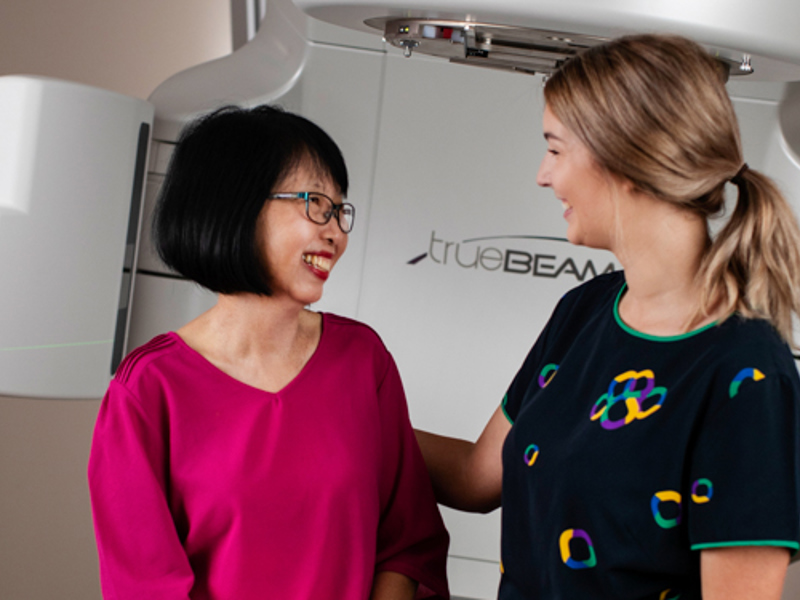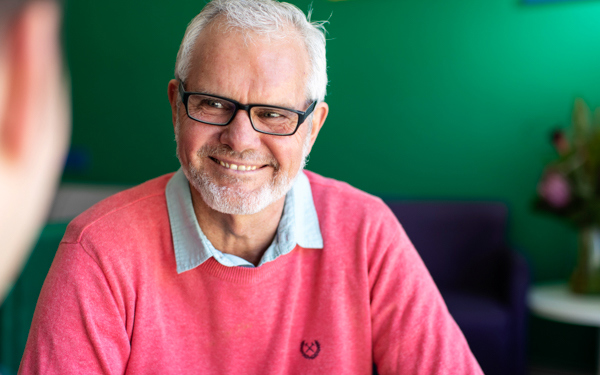What changes to the skin can I expect from radiotherapy?
Skin reactions caused by radiotherapy are also known as radiation dermatitis and occur to some degree in most patients undergoing radiotherapy Skin changes from radiotherapy will only occur in the area that is being treated. Whether you may experience skin changes will depend on:
The area that is being treated
How much radiotherapy you are receiving and how it is being given
Any other treatments or medications that you may be taking
Your age and overall health
Changes can include:
A change in skin colour (from slight pink to red)
Itching
Dryness or peeling
Irritation
Blistering, weeping
Pain or swelling
Unlike other reactions such as allergic reactions, skin reactions from radiotherapy begin slowly and predictably. This means that if you should experience a radiation-induced skin reaction, you will have time to talk to your treatment team and to receive the advice and assistance that you need to manage it.
The skin in the area being treated may become red and irritated and may look and feel something similar to a burn injury. While it may look and feel like a burn injury, it is important to know radiotherapy does not actually burn the skin, and it is not the same as a burn from a hot object.
Your treatment team will show you how to care for your skin and manage any skin reactions. It is important to always ask your treatment team about any side affects you might be experiencing before applying any creams or other remedies. Tell your treatment team if you’re worried about a skin reaction or are experiencing any skin changes.

How can I manage my skin during radiation therapy treatment?
You should keep the skin in your treatment area clean and protected from the sun, irritation, friction and excessive temperatures during radiation therapy and for two to four weeks after radiotherapy.
You should also avoid the use of perfumed products, sunscreen, talcum powder, products containing alcohol or the use of adhesive dressings in the treatment area. If a dressing is required, your treatment team will provide advice about the most appropriate dressing for you. Shaving of the affected skin area should be with an electric razor only.
-
Your treatment team will recommend a cream to help manage any skin changes. At the start of your treatment, apply cream to the area being treated twice a day. As treatment progresses, you may need to apply the cream three to four times per day.
Do not apply cream within the hour prior to your treatment, as cream needs to be well absorbed.
Please advise your treatment team if your skin becomes broken or has moist areas.
-
Avoid wearing tight fitting clothing that could potentially rub or irritate the skin in the area that is being treated. You may find vests, cotton ‘crop-tops’ or loose-fitting bras and underwear more comfortable. Avoid underwire or lace bras.
-
Avoid exposing the treatment area to excessive temperature including direct sunlight, very hot showers or baths, heat packs, ice packs, saunas or hot spas during the course of your radiotherapy.
-
You may wash the area of skin that is being treated with warm water and a mild non-perfumed soap. Pat dry the skin using a soft towel – do not rub. Use an electric razor if shaving in the area is necessary.
Seven to ten days after your treatment begins, you may begin to experience skin reactions in the area of your body that is being treated.
If your skin is affected, this reaction will last until the end of your radiotherapy treatment and will even continue to develop after treatment has finished. The reaction can become more intense towards the end of treatment and increase for up to two weeks after treatment finishes. Your skin usually returns to normal around four to six weeks after treatment finishes.

Washing and styling your hair
If you are receiving radiotherapy to the scalp area or to the brain, avoid frequently shampooing your hair. You may wash your hair with warm water and a mild, non-perfumed shampoo. Let your hair dry naturally. Avoid hair dryers, curling irons and straighteners. Continue this for two weeks after completing treatment or until there are no signs of irritation. Avoid using hairsprays, gels or styling products. Do not colour or perm your hair until four weeks after your treatment is complete.
Protect the treatment area from the sun
When outdoors, wear loose fitting protective clothing to protect the treatment area from the sun. If the treatment area is the head or neck, wear a wide brimmed soft hat at all times when outdoors. Avoid applying sunscreen to the treatment area during treatment.
Skin care products to avoid during radiation therapy
You should avoid applying the following products to your skin in the treatment area during radiotherapy treatment:
Alcohol
Perfumes
Products containing alpha-hydroxy acids
Creams and dressing containing metals
Sunscreen
Cornstarch
Baby powder/talcum powder
If you are unsure about which products to use on your skin during and after radiotherapy treatment, please check with your treatment team.
Frequently asked questions
References
The content on the Icon Cancer Centre website is for informational purposes only and should not be considered medical advice. It is not a substitute for consultation with a qualified medical practitioner. For personalised medical guidance, please consult with your GP or another qualified healthcare provider.
Why choose Icon?
At Icon, we’re committed to delivering the highest quality care, close to home. We combine advanced radiation technology with a team of experienced clinicians. We’re here to:
Provide care grounded in international evidence and clinical expertise,
Deliver treatment that is safe, precise, and tailored to your needs, and
Work alongside your existing care team to ensure a coordinated approach.
Our focus is on helping you move more comfortably and regain quality of life, supported by a team who puts your care first.




